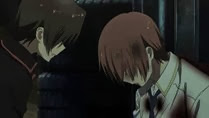 |
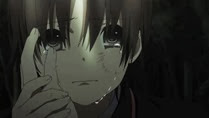 |
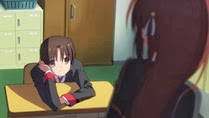 |
I’m still struggling mightily to wrap my thoughts – and feelings – around that ending.
OK, was anyone besides me thinking, “For God”s sake Riki, don’t get in the van!”?
It’s finally over (apart from EX and hopefully Kud Wafter, anyway) – after 39 episodes and a veritable avalanche of emotional highs and lows, Little Busters! comes to an end that’s undeniably a happy one. And while part of me is happy about it, I can’t help wondering why I’m not happier than I am. This isn’t a simple thing to answer, and I think it’s fundamentally tied into human nature and what one’s expectations for this finale were.
I didn’t know the details of the “True End” that this turned out to be, but it seemed pretty obvious after Episode 12 that we were headed for something more or less along the lines of what happened. I don’t have any major issues with the way the anime chose to go about depicting it. It was surprisingly mundane, and I mean that in a good way – Riki and Rin pulling everyone from the wreckage, lugging them up the hill on makeshift stretchers. I might have taken a few moments to call the authorities, and I’m still not quite clear on why Riki, Rin and Kyousuke weren’t killed when they were so close to the bus (they even got the driver out, too) when it exploded. But generally speaking, it was all sensibly carried off.
The key issue here was Kyousuke, who was indeed blocking the gas from escaping with his body. Riki realized that the only choice he and Rin had was the save everyone else first, and go back for Kyousuke last – which they did – and probably the emotional highlight of the episode was when the critically wounded Kyousuke reached out and wiped away Riki’s tear before losing consciousness. Fundamentally, all shipping aside (though not at Comiket) that’s the most important relationship in the series.
There’s some stuff here that definitely falls into the Visual Arts metaphysics realm, like Riki seemingly going back to before he was born to confront the issue of his narcolepsy. I take that as metaphorical but with Key you can never be sure, and there is a sort of Buddhist quality to it. The issue here is simple: is it worth living, knowing that sooner or later you’ll lose everything that you love? As you become more ensconced in Japan’s literary culture you realize just how much of it – anime and manga included – is rooted in Mono no Aware, the realization that impermanence is our perpetual state of being. “To live is to lose” – this is essentially a re-statement of mono no aware. In deciding that life is indeed worth living and that pain worth enduring for the sake of loving others, Riki – either symbolically or literally – rejects his narcolepsy and finds himself outside the bus, with a choice to make.
This is where things get difficult, and I think that can be summed up in one question: would Refrain have been a better series if Episode 11 had been the finale? There’s no question it was the emotional climax, but that’s a separate issue. In choosing this route – where everyone walks away (eventually) healthy and happy, is LitBus diluting the power of its core message? To some extent I think the answer is yes, and that’s why – despite the affection I have for these characters and the joy I get from seeing them live on – my feelings about the ending are mixed. I won’t go so far as to call the True Route a cop-out, but I think it is fair to ask – if there are no consequences for what’s happened, what was the point of it all?
To put that another way, if you frame the series around the question naked-universe Riki asks at the beginning of this episode – “is it worth it?” – the answer is a lot easier when the reality is what we got here than if it had been what we got at the end of episode 11. My answer would still have been “Yes” – it is worth it, because life is hope, and because even if they were gone the people who loved Riki wanted he and Rin to carry on and support each other. But making the question so much easier to answer robs the premise of some of its emotional power, at least for me.
Without any doubt this is a question that can be debated and debated, and certainly one on which reasonable people can disagree. It doesn’t change the fact that LB – especially Refrain – does a remarkable job of depicting the power of love and the difference it can make in the world. This is the essential nature of Little Busters! – a simple and innocent story about loving other people, how kindness can impact the lives of others and how the urge to protect those we love can sometimes be in conflict with the desire to see them grow strong enough to face the world. This is why of all the Key works that have found their way to anime, I find LitBus to be the most unspoiled and emotionally powerful. Kanon probably remains the best series when all factors are measured in, but Little Busters! is certainly the most emotionally effective for me.
There’s not much else to say, really – this is a show where the emotions do a very good job of speaking for themselves. LitBus is a series where you need to check your cynicism at the door and embrace the innocence of its vision for what it is – highly idealized, no question, but grounded in something that’s elemental for all of us. Whatever qualms I may have about the ending it’s undeniably fitting to leave the cast as we last see them – playing innocently as children, smiling, laughing (though not the uncharacteristically thoughtful Masato, interestingly) and most importantly, all together. Kyousuke isn’t weak and on crutches but his old, smiling self, stronger and more unstoppable than ever. If one were in a metaphysical frame of mind they could almost imagine that what we were seeing wasn’t the real world at all, but in fact a sort of Heaven or dream – because surely, for these children, this is the Heaven they would wish for. I don’t think that’s how it was intended, but with Key you can never be sure. Perhaps the idea is that what we’re seeing is whatever we bring to the seeing, and that whatever answer you arrive at, the ending is a happy one either way.
 |
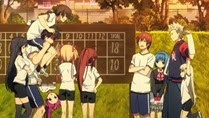 |
 |
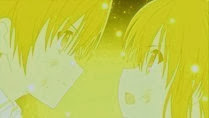 |
 |
 |
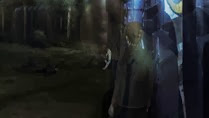 |
 |
 |
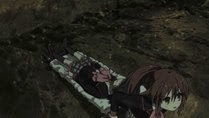 |
 |
 |
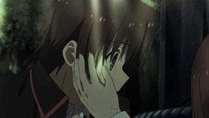 |
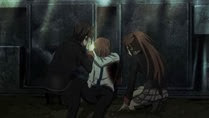 |
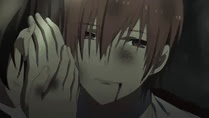 |
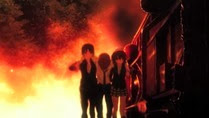 |
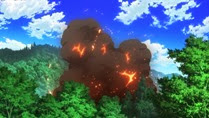 |
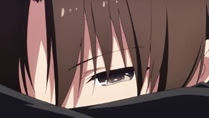 |
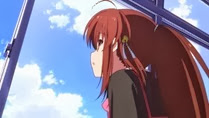 |
 |
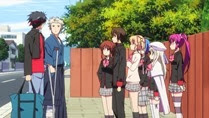 |
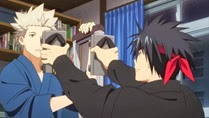 |
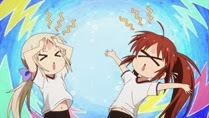 |
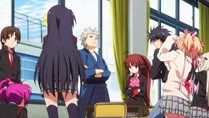 |
 |
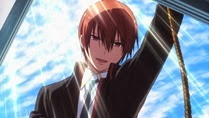 |
 |
 |
 |
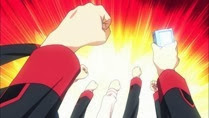 |
ED: “Little Jumper” by Rita
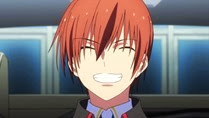 |
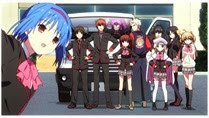 |
 |
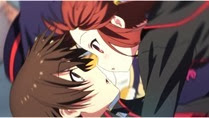 |
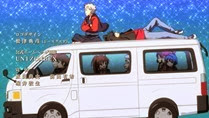 |
 |
 |
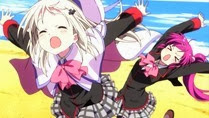 |
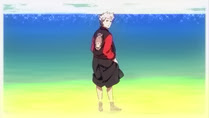 |
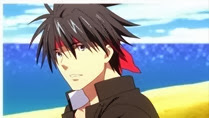 |
 |
 |


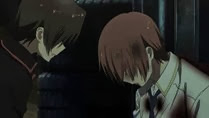
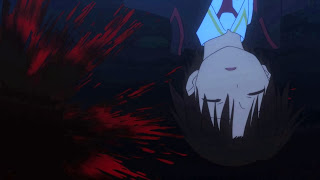
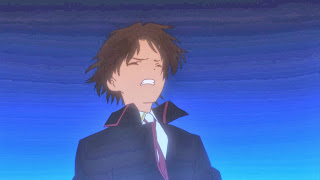
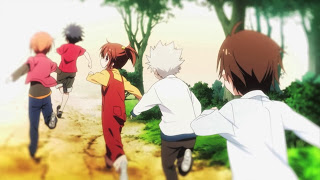
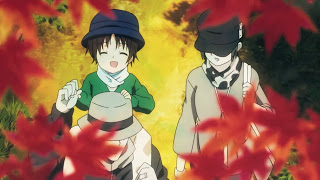
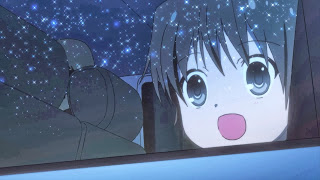
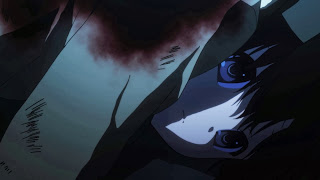
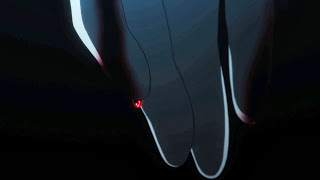
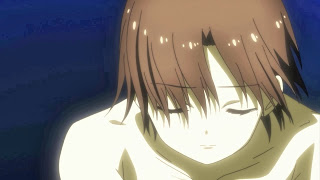


Flower
December 30, 2013 at 9:13 amHmm… Good wrap up.
Though on a larger level I have felt that they were (extremely broadly speaking) two trains of thought that come from the philosophical (and I would even day aesthetic, while some might say metaphysical) stance of mono no aware – one of rejection of as much of this life as possible in preparation for what lies beyond death, and the other of affirmation of all that is "good" in life as much as possible also in preparation for what lies beyond death.
It is in the latter sense that the anime adaptations of Key works primarily focus as far as I can tell. They are not necessarily literal narratives about "real life" or "non-fiction", but are rather fictionalized tales slightly fantasy'ified with the intent of getting across other things deemed more important by the writers (Jun Maeda or whoever) – perhaps because this is how I have always understood all the anime adaptations of Key I have always been a little puzzled by those who criticize these works for their deux-ex-machine elements.
Because this is how I understand these Key adaptations I have no problems with the narrative twists, and I also think it works very well here too (though the Clannad series still reigns in this area of material ^^ ). Still, having said that, I can say, and say it happily, that Little Busters and Refrain take can stand on the same stage as Air, Kanon and the Clannad series and hold their heads high as among equals. Huzzah to J.C. for doing such a fine job. 🙂
111592374751156215543
December 30, 2013 at 9:19 amI agree with you for the most part that the so called true-ending robs the series of some of its emotional impact. But when it comes down to your question 'what was the point of it all? ' I think it''s fair to throw your previous words back to us: that little busters is a series where you have to leave your cynicism at the door. It was worth it because without all that effort the finale would not have been possible. It is a message of hope because all their side characters poured their hearths into making Rin and Riki stronger to prepare them for the worst, and life payed them back by making Riki and Rin stronger than they had ever dared hope. Unrealistic? Totally. Do I like it? Of fucking course. Even if it takes a while to set my visceral disappointment and craving for tragedy to the side. :p
–Proto
admin
December 30, 2013 at 10:01 amWow – hisashiburi, desu ne?
That's certainly a valid interpretation of the "point". In a sense, goodness is its own reward. That doesn't change the fact that some of my emotional buy-in from episode 11 is diluted, though.
I still muse on that last scene, though, and how unreal it all seems. Almost too perfect…
111592374751156215543
December 31, 2013 at 12:40 amI've been lurking around, I just don't post as much anymore. Still, I have you to thank you to watch the series. I had already played the game so I saw little reason to sit through all 36 episodes, but your unabashed enthusiasm convinced me to give it a try. And I have no regrets.
–Proto
Maxulous
December 30, 2013 at 10:24 amAs I’d said before, the finale certainly deflated the significance of the message for me – especially since Kyousuke (not Riki) is still driving the van, so to speak.
It was clear from the beginning that the little busters understood the love and power of friendship, it was the will to accept loss and the strength to live on that the series was communicating. If indeed Kyousuke had passed on the "torch" to Riki in his final moments, the rest of this ending may have resonated. But all that was thrown right under the bus when the writers effectively dumped us back to what feels like S1E26 dreamland.
But who knows, perhaps that was intentional? Aside from Kengo (who is always breaking limbs), everyone else is suspiciously 100% fighting fit. Every passenger surviving that fall in the first place too convenient. There is also something off in the lyrics to Rin’s wistful melody after they cut from the explosion, that give an impression that what we are seeing is Riki and Rin's dream world after all.
It’s dark under the overhang
It’s scary under the wheel
It’s cold in the grass
Let’s nap in the sunlight
The moon in our eyes
And courage in our whiskers
The question is – if they're all happy in key heaven, doesn't that leave even less for the audience to take away from the ending?
Maxulous
December 30, 2013 at 10:35 amI was also more a fan of Riki's narcolepsy explained as a mechanism of Kyousuke's world – instead of a result from his traumatic childhood experience.
Vlad C
December 30, 2013 at 5:21 pmWell, I was disappointed in the adaptation at least 80% of the time I was watching it. The show could've been much better done and focused on the character attachment and exploration, but it was "fine' considering all these limitations. The core story and themes carried it for a lot of people, but the show feels much more hollow because of its pacing. Well, I couldn't ask for much when JC Staff and their worst director are in charge of adapting my favorite story to life with a bare bones budget and tight episode count. I'm glad it wasn't a disaster, and was actually emotional for some people. With how they got to the farewells at about 4x the pacing of the VN, I didn't think people would actually cry for Kyousuke's farewells or feel for the bros that much. This certainly wasn't a Fate/Stay Night, Umineko, or AIR, which were pretty badly done and didn't live up to their source material, but I'd be lying if I said I was content with Little Busters, knowing it could've been much better done. Even the music directing and writing feels rushed and cheesy, like they just guessed what "might" be good music to use during the scenes without considering what Jun Maeda and the anime scriptwriter had in mind. There are plenty of complaints outside of budget and time constraints. To the little things like never explaining that Kyousuke was the reason why Masato had the delusions, or that Miyuki died int he real world, I kept thinking they would've done these points justice, because they're what helped give more believability for Kyousuke's regrets and harsh actions and whatnot.
Going into the show expecting a silly baseball slice of life anime and then getting to Refrain, the show quickly subverts that and becomes great by comparison, but Refrain was hyped as Maeda's untoppable self-proclaimed masterpiece, and people expected it to top After Story. If it was done as well as it could have, that would be a common debate. Most people didn't enjoy the story as much as you, Enzo, because you slowed down to embrace all the depth the show had and assess its character motives and themes. It would've been much more attention grabbing and enticing for everyone to get engaged in the story from the start.
Anyway, if there's anything I got out of this, it's to never get your hopes up for adaptations of source material, especially if it's good.
admin
December 31, 2013 at 1:25 amI think you have to be realistic about what you complain about. When EX and Kud Wafter (JCS has said they'll adapt everything) are added in, LB will have a higher episode count than KyoAni gave any of their Key titles. And in truth, I'm no friggin genius – if the themes you talk about were obvious enough for me to pick up on them, the staff did a good enough job of communicating them. It's not their fault if some people went into the series not looking for those themes.
For me, this certainly tops After Story, but I won't go into the reasons as that's a long conversation. I think the staff did a very fine job here. Was it perfect? No, not even from an anime-only perspective – but very few series are ever functionally perfect. Anime are not VNs, and major changes have to be made. Sometimes they don't work flawlessly – it goes with the territory. I respect that as a VN reader and expert you're disappointed, but I would humble suggest it's more an issue of expectations than execution.
In any event, thank you for your many contributions to the comments on this series – they've certainly been fun to read and added to my understanding of the series.
Daniel Miranda
December 30, 2013 at 8:41 pmLittle Busters! message has always been for me that Life is enterteining. Those lines were everything for me. I thought that I had waste my youth until now. I have to enjoy my youth because life is fun. I think that's the message I got from playing it. Is it worth it? Yes because life is fun.
maverickmann84
December 31, 2013 at 12:04 amI agree the the inmpact of the "good end" isn't as big as it would have been if ep 11 was the finale, but I feel like maybe the ending we got fit the series as a whole better. At least the whole "friendship conquers all" aspect that was so large a part of the first season. Even being unsure about which ending I would have preferred (though I saw this coming a mile away) I still think it was one of the better anime this year.
On a side note I saw the first 13 eps of LitBus eng dub has come out and it's as bad as a dub could be. The worst being obvious female voice actor Riki and Kud's horrible Russian accent. Though a lot of the other voices don't seem to fit. Some jokes seem to work a bit better hearling them in a language I understand, but overall its bad.
Balrog
December 31, 2013 at 3:08 amI'll just say that i really like how J.C. Staff did this, most of the flaws this show has were already there in the VN. Sadly i'm 100% sure that for the next title "Rewrite", they are going to use some else because that one has battles and that's not J.C thing. Also doing rewrite is going to be a mess because the routes put the protagonist in a position were he fights against the other heroines. But that is still far ahead, i don't think they 'll do Rewrite until 2015
Balrog
December 31, 2013 at 3:11 amsomeone*.. hugh i really should check before posting
111592374751156215543
December 31, 2013 at 3:25 amShakugan no Shana? :p
-Proto
Zeta Zero
December 31, 2013 at 2:06 pm1997 era J.C Staff could handle battle choreography no problem.